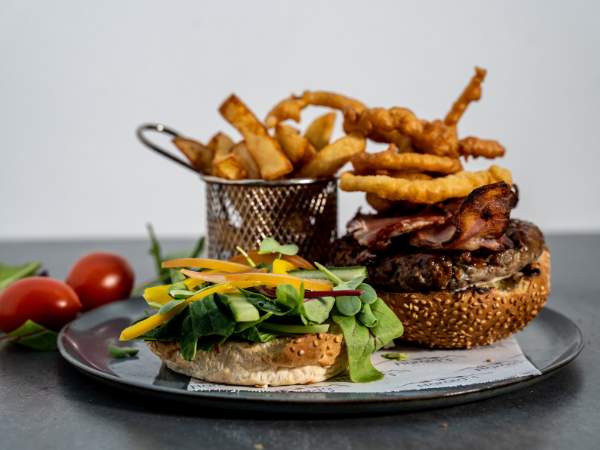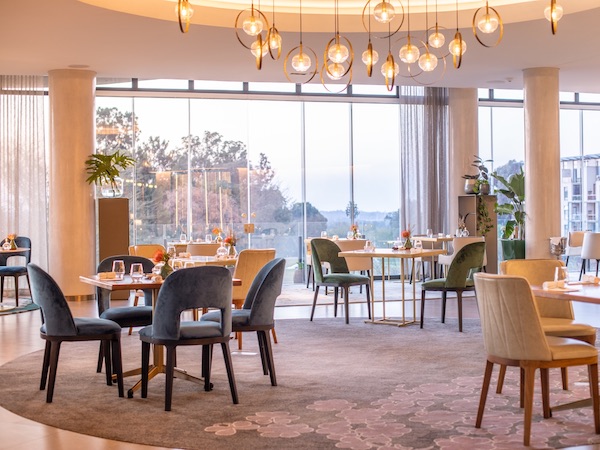News
Simply organic
Wednesday, March 31st, 2010“You see,” says Jörg Pfützner, a sommelier turned importer, “the combination is a little awkward. Let’s try it another way.” Vanessa Marx, chef of the soon-to-be opened restaurant Dear Me, walks over to the gas hob. A pan is hot and smoking. In goes another blood-red ostrich fillet.
Vanessa finishes searing the fillet; and deftly slices it into thin red ribbons. “This time,” says Jörg, “let’s add a little honey.” Using our fingers, we scoop up ostrich, honeyed mango and rocket, and sip the Palladius (a white wine made with 12 different varieties).
Magically, a combination that was slightly awkward before is now smoothly sublime; the separate components both elevated by the match.
We’re gathered at Ilze Koekemoer’s (owner of Dear Me) house in Orangezicht. The fynbos and mountains are behind us and the city is spread out down below. Our lofty vantage point is just the place to be pairing food and wine. The somewhat pretentious task is brought down to Earth in this airy, sky-high house. We’re standing at the kitchen counter, which isn’t visible at the moment thanks to the slew of technicoloured ingredients piled on it.
There’s everything from oyster mushrooms with burnt orange edges, to quail submerged in a honey and vanilla marinade. A crayfish is neatly cleaved in half waiting by a bowl of green peas. And there’s also crunchy asparagus and royal purple figs. The ingredients are all organic, naturally grown or ethically sourced – much like the wines they will be paired with.
“Organic wine shouldn’t taste any different from non-organic wine,” says Jörg. “Let’s taste the wines and arrange them in terms of weight and intensity. Flavour and weight are different things in wine; compare the principle to a green pepper, which is light in weight, but intense in flavour.”
The South African wine industry is slowly creeping towards a system of organic cultivation. The problem is that the term organic can be rather hazy. Roughly, it means that all things synthetic are forbidden in the wine-making process, and the emphasis is on increasing the fertility of the soil in the vineyards. Many wine-makers and viticulturists are shrugging off this blanket-term, due to the influx of red tape that follows the desire to conform to natural practices in the cellar.
This is where two new terms enter the playing field. There’s the more esoteric biodynamic farming, in which organic principles are adopted and the viticulture is aligned with lunar and cosmic rhythms. Then there’s also naturally grown or “slow wine” where organic principles are applied in the vineyard, while in the cellar traditional wine-making practices are observed and the wine is left to ferment naturally.
Pop! Jörg has opened the Avondale MCC. Certified organic, this wine is truly a rarity, one of the only organic Methode Cap Classiques in the country. My first instinct would be to pair it with the crayfish, but Jörg has other ideas. “Take a sip, and see what will work,” he says. “When I worked with Harald (Aubergine) that was how we used to do it. We came up with some weird stuff, but dishes that actually worked well. We once made a beetroot soup with basil ice cream and it was one of the best dishes I’ve ever had.”
“Maybe with the sorrel cream?” says Vanessa proffering a spoon of the sauce. “It turns the texture of the MCC to beach sand,” laughs Vanessa. “Hmm, yes,” says Jorg, “the acidity brings the tannins to the fore.”
“I like food that’s simple,” says Vanessa, rummaging through the ingredients. “The food at Dear Me will have lots of herbs and fresh produce.”
“Chefs need to have a good understanding of produce,” agrees Jörg, “and be able to tell the difference between a good piece of meat and an extraordinary piece of meat.”
A match is finally found for the MCC – it works with the unctuous vanilla-and-honey quail.
Vanessa dresses the crayfish with fresh, green herbs and places it in a bamboo steamer. It just needs a couple of minutes. Soon she’s arranging it on a plate like an expensive bouquet; lashings of sorrel cream melt into its white flesh and green peas finish it off. And to match? The Waterkloof Sauvignon Blanc. The sauvignon blanc and the sorrel is a match where both parties benefit. “There is sweetness here,” says Vanessa, “mmm, it’s like tasting green fields.”
Vanessa tosses the pinky-orange oyster mushrooms in a pan hot with butter and gnocchi. “Here, taste this,” says Vanessa offering me a piece of raw mushroom. The earthy flavour has an unusual tang to it, like orange zest, and it goes well with the Mullineaux.
“Yip,” says Jorg. “It’s about as zesty as a mushroom can get!”
Pork fillet is pan-fried and added to the gnocchi; Vanessa plates it with a brown butter and crispy sage sauce. Jörg dips in a fork. “It needs a squeeze of lemon,” he says, adding one, “otherwise the slight bitterness of the brown butter will kill the wine.”
Vanessa and Jörg are happily tasting and pairing in the kitchen, and it’s clear that Dear Me, which will be opening in Longmarket Street in June, seems to have all the ingredients just right – food that’s ethical and delicious and a bubbly and inspiring chef in Vanessa. It’s an organic match.
Pairing notes
· Avondale Chenin Blanc as an aperitif.
· Tulbagh Mountain Vineyard’s Syrah/Mouvedre (Woolworths) was paired with kudu loin and glazed purple figs. · Waterkloof Circumstance Chardonnay paired with seared salmon, new potatoes, crispy pancetta and sorrel cream.
· Ladybird Laibach paired with roasted beetroot, pan-fried liver and fresh thyme.
· Sequillo Red paired with lamb loin, rosemary jus and roasted cherry tomatoes.
· Reyneke Reserve Red Blend also paired with lamb loin, rosemary jus and roasted cherry tomatoes.
· Tulbagh Mountain Vineyards’ Vin Pi was paired with a fig and frangipane tart with crème fraîche.
By Malu Lambert








